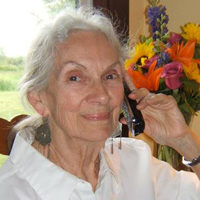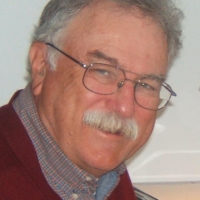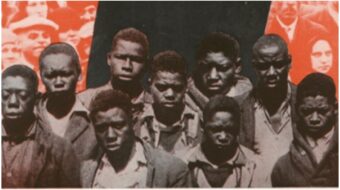40 years after Bloody Sunday, 10,000 march in Selma
SELMA, Ala. — Singing “Ain’t going to let nobody turn me round,” 10,000 marchers crossed the Edmund Pettus Bridge here March 6 to protest Bush-Cheney voter suppression tactics and to demand renewal of the 1965 Voting Rights Act set to expire in 2007.
The multiracial throng, men and women, young and old, retraced the steps of voting rights marchers who were clubbed and tear-gassed by Alabama troopers on “Bloody Sunday,” March 7, 1965. That brutal attack galvanized the nation to enact the Voting Rights Act a few months later.
Rep. John Lewis (D-Ga.), then a Student Nonviolent Coordinating Committee (SNCC) organizer, was clubbed nearly to death that long-ago day. He led 40 of his U.S. House and Senate colleagues at this 40th anniversary “Bridge Crossing Jubilee.”
Lewis was engulfed by admiring youth. “It is good to see young people out here making some noise,” he told the World as he marched. “A lot of people are too quiet. If you don’t like the direction the country is going, you have the responsibility to stand up, to protest nonviolently.”
Rep. Kendrick Meek (D-Fla.), who led Florida’s “count-every-vote” fightback after the 2000 elections, told the World the strategy now “is to get renewal of the Voting Rights Act early.”
“We shouldn’t wait,” Meek said, warning that “the Bush administration has not given us any signal of support.”
Senate Majority Leader Bill Frist (R-Tenn.) and other Republican lawmakers joined the march. “They are welcome to join us. But we have to be clear that their agenda is not our agenda,” said Ron Daniels, president of the Center for Constitutional Rights, which has defended victims of Bush administration torture in Iraq, Afghanistan, and Guantanamo, Cuba.
“Our agenda is wider democracy,” Daniels said. “The reactionary forces talk of ‘democracy’ and ‘freedom’ but they condone torture.”
A big crowd gathered in front of Brown’s Chapel AME Church for a pre-march rally. Coretta Scott King, widow of Dr. Martin Luther King Jr., reminded the crowd that only 216 African Americans held elective office in 1965. Today, 9,300 African Americans are in office. “It was the Voting Rights Act that produced this growth in our political empowerment,” she said.
Yet 31 percent of African-American males in Alabama are denied the right to vote, mostly due to disenfranchisement of former felons. “It is a form of taxation without representation and we need to mobilize to put an end to it,” King declared. “This last election showed us once again all forms of devious tricks were used to keep us from voting.”
An hour earlier, inside the historic chapel, headquarters of the civil rights movement in the 1960s, Frist sweated as the Rev. C.T. Vivian called on the people to march “all over again,” because “our needs are not being met.”
Vivian, a close aide to Dr. King during the Selma struggle, flayed Bush for dragging the nation into war. “It is not possible to achieve peace through war,” Vivian said.
“Just because you have more guns than all the rest of the world, they’ll still hate you. I thought we had learned in Vietnam. That war destroyed the anti-poverty program and hurt the poor. The rich were not hurt.”
Vivian received a standing ovation.
The Rev. Jesse Jackson echoed that message. “The fight for the right to vote continues,” he said. He noted that the recent elections in Iraq used proportional representation, which protects minority voting rights. But in the U.S., he said, millions, disproportionately African American, are denied voting rights.
Meanwhile, Jackson said, “Alabama cannot meet its Medicaid matching formula. … Alabama sends thousands of inmates out of state at a cost of $46,000 each. But Alabama spends only $5,000 per pupil on education.”
The Bush budget, he added, will slash funding for Pell Grants, Section 8 housing, and food stamps, all devastating cutbacks for working people and the poor.
Jackson called for the collection of 1 million petition signatures to extend the Voting Rights Act. He announced that thousands will march in Atlanta on Aug. 6 to demand the right to vote.
Jackson led the crowd in a chant, “To win the right to vote, organize! End the war!”
Marching in the middle of the crowd were Lutheran pastors Robert and Jeannie Graetz of Dayton, Ohio. “We worked closely with Dr. King during the Montgomery Bus Boycott,” the Rev. Bob Graetz said. “I was the only white preacher of a Black congregation in Montgomery. Three bombs were thrown at our house and two went off. If the third had exploded, I would not be here now. It was 11 sticks of dynamite tied to a can of TNT. We had four little children in our house at the time.”
Asked to measure the changes since then, he chuckled. “We have a Black mayor of Selma, James Perkins. There have been some economic breakthroughs too. But I think the economic status of the African-American community is worse now than in 1965.”
His wife of 54 years broke in, “They are fighting this war in Iraq on the backs of the people. They want $80 billion more for the war.”













Comments